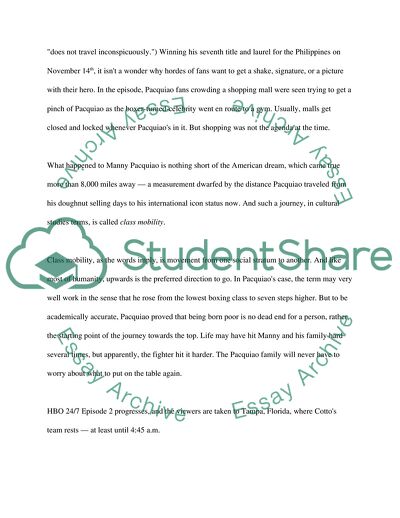
- Home
- Free Samples
- Premium Essays
- Editing Services
- Extra Tools
- Essay Writing Help
- About Us
- Studentshare
- Subjects
- Miscellaneous
- Cultural Studies Final Essay: (To be determined by the writer)
Cultural Studies Final : (To be determined by the writer) - Essay Example

- Subject: Miscellaneous
- Type: Essay
- Level: Masters
- Pages: 4 (1000 words)
- Downloads: 0
- Author: kulascarrie
Extract of sample "Cultural Studies Final : (To be determined by the writer)"
Manny sold flowers and doughnuts on Philippine streets, and through this, he was able to help his family get a little more food on the table. Eighteen years after, HBO 24/7 has a whole lot different story to tell. Becoming a professional boxer at age 16, Pacquiao has come a long way from his roots. Now, police escorts and bodyguards travel alongside Pacquiao. ("The peoples champion," indeed, "does not travel inconspicuously.") Winning his seventh title and laurel for the Philippines on November 14th, it isnt a wonder why hordes of fans want to get a shake, signature, or a picture with their hero.
In the episode, Pacquiao fans crowding a shopping mall were seen trying to get a pinch of Pacquiao as the boxer-turned-celebrity went en route to a gym. Usually, malls get closed and locked whenever Pacquiaos in it. But shopping was not the agenda at the time. What happened to Manny Pacquiao is nothing short of the American dream, which came true more than 8,000 miles away — a measurement dwarfed by the distance Pacquiao traveled from his doughnut selling days to his international icon status now.
And such a journey, in cultural studies terms, is called class mobility. Class mobility, as the words imply, is movement from one social stratum to another. And like most of humanity, upwards is the preferred direction to go. In Pacquiaos case, the term may very well work in the sense that he rose from the lowest boxing class to seven steps higher. But to be academically accurate, Pacquiao proved that being born poor is no dead end for a person, rather, the starting point of the journey towards the top.
Life may have hit Manny and his family hard several times, but apparently, the fighter hit it harder. The Pacquiao family will never have to worry about what to put on the table again. As narrator, Liev Schreiber, utters the words above, Joe Santiago is seen grabbing a cookie from a yellow packet whose torn portion he neatly presses
...Download file to see next pages Read MoreCHECK THESE SAMPLES OF Cultural Studies Final Essay: (To be determined by the writer)
Horizontal Map and Curriculum Chart
The Use of Academic Voice about Mature Age Students Taking Psychology Courses
Academic Voice
Term Papers Contents
Organizational Culture Is Fundamentally about Symbolic Meaning and as Such Cannot Be Managed
A Reflective Summary of the English 131 Class
Limiting Hours of Television
How Might Teachers Respond To Writing As A Work In Progress

- TERMS & CONDITIONS
- PRIVACY POLICY
- COOKIES POLICY